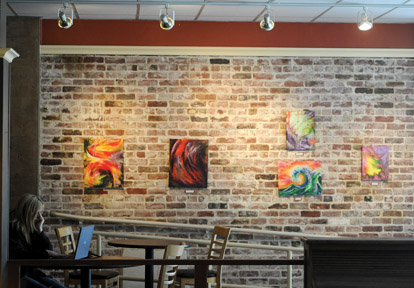
Mars Hill among the two local businesses entered in lifestyles
category
Two San Benito county businesses entered the Monterey Bay
Regional Business Plan Competition, a regional project started to
help small companies develop.
To be eligible, the businesses had to be start-ups or emerging
businesses that are located in Monterey, Santa Cruz or San Benito
counties. The business plan must include plans to grow to at least
three full-time employees in addition to the founders within three
years.
Mars Hill among the two local businesses entered in lifestyles category
Two San Benito county businesses entered the Monterey Bay Regional Business Plan Competition, a regional project started to help small companies develop.
To be eligible, the businesses had to be start-ups or emerging businesses that are located in Monterey, Santa Cruz or San Benito counties. The business plan must include plans to grow to at least three full-time employees in addition to the founders within three years.
The final presentation was held May 13, and though the local businesses lost out to a Santa Cruz company called Megan’s Living Well, they still can attend business development workshops and use the feedback they received from judges as they move forward with their plans.
The San Benito businesses, Mars Hill Coffee House and Utilities Independence Solutions, entered in the lifestyle category as businesses that will not provide a tenfold return to investors over the next three to five years, but that will create an economic impact regionally. The two other categories included student entrepreneurs and teams, as well as venture play for fundable, scalable business ideas that will provide a tenfold return to investors over the short term.
“We didn’t win, but it was still a very good experience for the leadership team at Mars Hill,” said Rico Horca, a volunteer at Mars Hill and a consultant for the Small Business Development Center, a government-funded agency. “We got a chance to meet a lot of skilled business people, and that is pretty much the whole reason to do the competition. We are painfully aware that the team could really use good business advice and exposure.”
Each business submitted an application, before being selected to compete in the final presentation phase of the competition.
In its summary application, Utilities Independence Solution is described as “a pre-formation ‘utility company’ designing, building and maintaining power, water and waste water systems for small scale unregulated applications.”
The company’s application said it provides an alternative to traditional and highly regulated utilities at commercial and residential scales. Some of their methods for offering alternatives include high-efficiency cogeneration, portable rainwater captures and advanced waste composting technology for the tri-county residential and commercial markets.
As for Mars Hill, Horca explained that it has a unique situation as the coffee house is run as a nonprofit by inChrist Church. The coffee house employs a manger, assistant manager and 10 baristas. There are also many volunteers who help out, including the management team responsible for creating the business plan.
“We found out a little late about the competition,” Horca said. “We got a one-pager in and we were selected so we’ve been kind of scrambling.”
Of the competition, Horca said that many of the businesses involved had not gotten to the point of creating a business plan.
“You are put in a position where you have to generate a business plan,” Horca said. “It was very enlightening to see not only the other competitors in our bracket, but what they call the venture bracket. These guys are looking for anywhere from half a million to a million dollars. We were really looking for networking.”
Unlike the venture entries, Horca said that Mars Hill has a different goal than most coffee shops, since it is not intended to maximize profits but serve as a hub for the community.
“We want to promote the arts, both visual and music,” Horca said. “And there is really no other word to use – to minister to people in the margins that would normally not be ministered to.”
In the application summary, the plan says, “We support artists, musicians, and those in the margins – the poor, the homeless, the hurting and the abandoned.”
Horca explained that any money made by the coffee house – which sells drinks, bagels, scones and cookies – above its operating expenses would go back into the community to other charities.
“If we were making a profit, it would not go back to the church, but to help and meet needs of other nonprofits in the area,” Horca said.
The location has already become a venue for free concerts for a variety of music from worship music to rock bands. The walls are full of artwork by local artists, who offer pieces for sale. The conference room is available for free use, on a first-come, first-served basis. Horca referenced the Save the Music drive, for which Mars Hill hosted a play-a-thon a few weeks ago, as one of their partnerships with a nonprofit.
As for the business plan, he acknowledged that they do need to look at ways to become more efficient to boost profits.
“If Mars Hill learns how to tighten up operations and be more efficient, we can become profitable,” Horca said.








